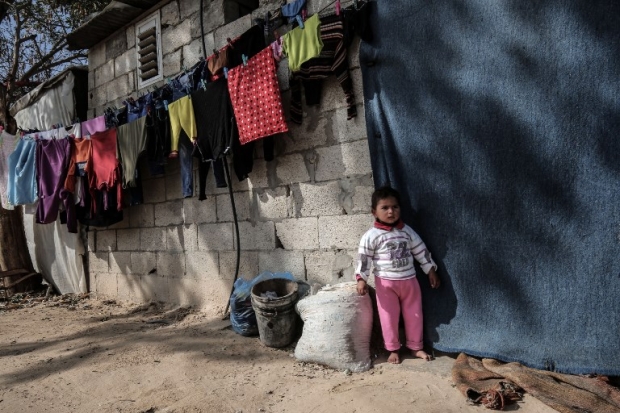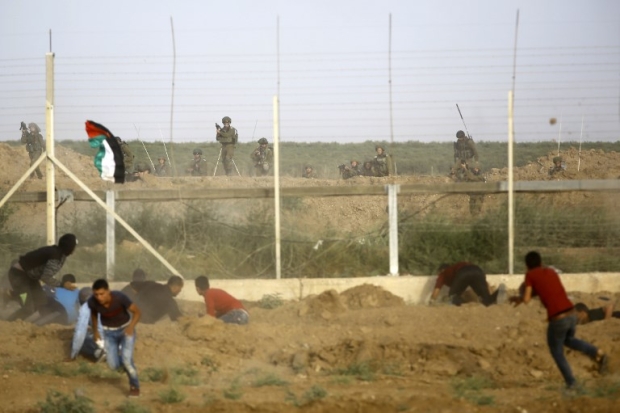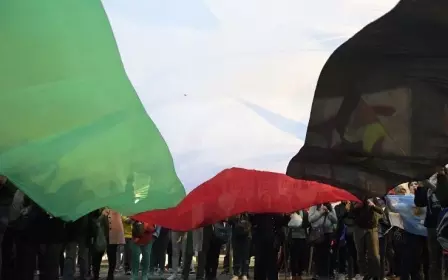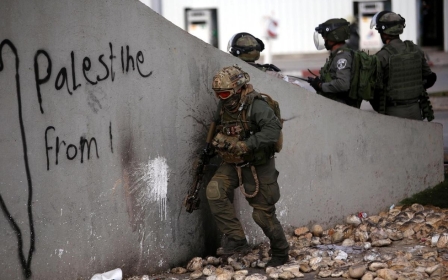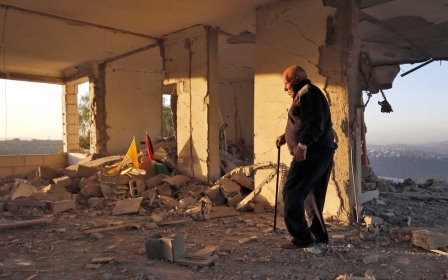The real cost of Wajahat Ali's interventions on Palestine
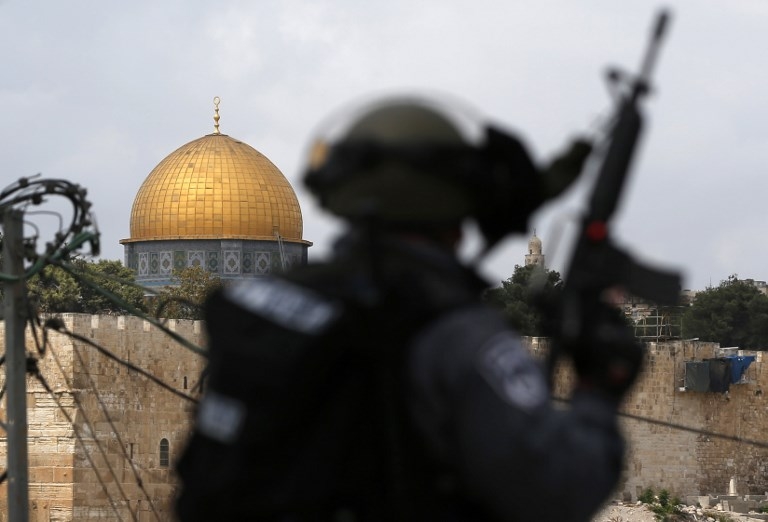
Last week, the Islamic Society of North America (ISNA) disinvited Wajahat Ali as a speaker from its annual conference, citing his troubling and divisive work on Palestine as one of the reasons.
While ISNA’s letter did not explain its rationale adequately, Ali has focused on straw-man critics, avoiding the substantive objections raised about his work on Palestine. In one instance, he suggested he was disinvited from ISNA for straying from an unspoken “dogmatic line [American Muslims] have to adhere to on Palestine”.
In another, he suggested this was an “excommunication” from ISNA for merely talking to Zionists. As Palestinian Americans who regularly disagree with each other and engage with political opponents, we can firmly say that neither free thinking nor engagement with Zionists is driving the legitimate backlash to Ali’s work. His recent interventions on Palestine actively undermine efforts to educate about, and build solidarity with, the Palestinian struggle for justice.
Beyond a difference of opinion
We know Ali personally. Noura Erakat is a former classmate of Ali’s at UC, Berkeley who once sought his support to begin a writing career. Omar Baddar, a political analyst and the deputy director of the Arab American Institute, is his former colleague at Al Jazeera, and they formed a genuine friendship over several years. Our goal here is to clarify how Ali's interventions on Palestine exceed a mere difference of opinion, and to rebuff his gross mischaracterisation of the critique, which he has caricatured either as absurdly conspiratorial or intolerant towards dissent.
Let's start with what Ali gets wrong, then explain why it matters and how it goes beyond disagreement.
The Atlantic is a major publication currently run by Jeffrey Goldberg, a former Israeli prison guard who provides hardly any space for critical Palestinian voices. Recently, Goldberg commissioned Ali to travel to the occupied West Bank to meet with Israeli settlers and produce a short documentary and a long-form essay entitled A Muslim Among Israeli Settlers.
The project deliberately reifies a distorted narrative around the conflict that obscures the fundamental injustice driving it
To an uninformed reader/viewer, these works may come across as nuanced and thoughtful, which is precisely what makes them dangerous. The project deliberately reifies a distorted narrative around the conflict that obscures the fundamental injustice driving it.
Ali’s work depicts the Israeli-Palestinian conflict as a problem of antipathy between Muslims and Jews, instead of accurately conveying it as a case of settler-colonial oppression, confinement and displacement targeting all indigenous Palestinians, regardless of their religious faith. He presents the controversy over Jerusalem as a subjective matter to each of the three major faiths: it is supposedly occupied territory “for Muslims”, liberated territory “for Jews”, and the site of Jesus’s crucifixion “for Christians”. These are simply false dichotomies.
Jerusalem’s status as occupied territory is not a “Muslim” perception; it is the designated status of the city, according to international law. Palestinian Christians, who are primary stakeholders in this conflict, also suffer under Israel’s brutal occupation of the West Bank, Gaza and East Jerusalem. Israel has denied Palestinian Christians from the West Bank and Gaza access to the Church of the Holy Sepulchre for nearly a decade, even during Easter.
Rendering Palestinian dispossession invisible
Ali also imposes a false equivalence by presenting both sides of the conflict without regard to the power disparities that distinguish Israel - the only nuclear power in the Middle East that benefits from unconditional financial, military and diplomatic aid - from Palestinians, a stateless people who have been subject to discrimination and violence tantamount to apartheid, as most recently documented by the UN Economic and Social Commission for Western Asia.
All sides may endure pain, but that does not alter the fact that in Israel/Palestine, there is an oppressor and an oppressed; a dominant class and a dominated population; a settler state and a native people.
Between the false religious frame and the false balance, Ali is left to wonder: “Is this land worth all the pain and suffering and bloodshed?” But this is the wrong question, because this is not a religious fight over neutral land with equal claims. The question is whether one’s home is worth defending from occupiers, and the answer is an unequivocal yes.
Following criticism among Palestine solidarity circles of Ali’s work in the Atlantic, Goldberg hosted a discussion on the Israeli-Palestinian conflict on Radio Atlantic with Ali and an Israeli senior fellow at the Shalom Hartman Institute, Yossi Klein Halevi. Once again, the Palestinian perspective was missing, but Ali was there to present his "Muslim perspective", where he tried to argue in support of Palestinians.
Despite Ali’s lack of subject-matter expertise and his distorting approach, his Muslim identity gave the impression of balance in the programme. Worse, Ali repeatedly reaffirmed many of Goldberg's biases on the topic.
When Goldberg asked Ali whether he, "as a non-Arab Muslim", found an unhealthy obsession in his community with Palestine, Ali responded in the affirmative, saying the preoccupation with Palestine was "almost pathological". Ali continued discussing the "resentment" some Muslim communities feel towards Palestine as an issue that was "thrust upon [them]".
He prefaced Palestinian suffering with disclaimers, such as "what people see as Palestinian suffering", and offered no rebuttal to Goldberg's contention that the occupation is not the main impediment to peace, nor to Halevi’s preposterous claim that a Palestinian “culture of hatred” was perpetuating the conflict.
Organised effort to undermine BDS
Much of Ali’s problematic engagement with the Israeli-Palestinian conflict can be explained by his deep relationship with the Muslim Leadership Initiative (MLI). Although MLI claims interfaith harmony as one of its primary goals, it is in fact a project of the Shalom Hartman Institute, an Israeli organisation “involved in the efforts to thwart BDS”, according to the Israeli Ministry of Strategic Affairs. By the Israeli government’s explicit admission, MLI is part of an organised effort to undermine global solidarity efforts to hold Israel accountable. Making the “interfaith” scam more blatant, one of the Shalom Hartman Institute’s financiers is reportedly one of the top seven donors to anti-Muslim hate groups in the US.
As a direct result of their willingness to further MLI’s distorting narrative of the Israeli-Palestinian conflict, participants are provided significant platforms in a US media environment plagued by a substantial pro-Israel bias
MLI courts American Muslims with a free trip to Israel under the guise of interfaith "dialogue", where the real agenda is to faithwash the oppression of Palestinians. Some MLI participants may not personally share this agenda, but this does not change that it remains the impact of their participation. While interfaith dialogue is a social good, this project is detrimental to the Palestinian struggle in multiple ways.
First, the initiative feeds the religious framing of the Israeli-Palestinian conflict, obscuring Israel’s settler-colonial project, which is predicated on the erasure of Palestinian natives, regardless of religious affiliation. The Palestinian struggle has religious dimensions, but it is a political conflict to be resolved by ending the occupation, siege and discrimination imposed on the native Palestinian population.
Second, by conflating political Zionism and the Jewish faith, MLI marginalises a global Jewry that does not necessarily identify with Israel, thereby furthering a dangerous talking point that criticism of Israel is tantamount to anti-Jewish bigotry. This is an especially salient point in light of US President Donald Trump’s nomination of Kenneth Marcus for assistant secretary of civil rights in the department of education; Marcus seeks to amend federal law to make criticism or protest of Israel on university campuses tantamount to harassment against Jewish students.
The death knell for MLI is the fact that there is not a single Palestinian Muslim among its ranks. The sole Palestinian participant in MLI quickly withdrew from it after seeing it in action from the inside, describing the programme as a "betrayal" of the Palestinian struggle.
MLI also furthers the disturbing trend of not letting Palestinians speak for themselves. It is a basic and fundamental principle of advocacy to focus on those most affected and those with the most to lose.
As a direct result of their willingness to further MLI’s distorting narrative of the Israeli-Palestinian conflict, participants are provided significant platforms in a US media environment plagued by a substantial pro-Israel bias. It wasn’t a coincidence that Rabia Chaudry published a piece in Time upon her return from an MLI trip to Israel, where she argued that Israelis are right to fear lifting the boot of occupation from Palestinians. Nor is it a mystery as to why Ali was picked for Goldberg’s settlements project in the Atlantic and the subsequent podcast.
But that and other recent media appearances by Ali reveal something else as well: When MLI participants are promoted to the national stage as representatives of the Palestinian issue, they end up engaging in debates with more savvy and better-equipped apologists for Israeli policies, leaving the Palestinian perspective entirely invisible while giving the audience the false sense that they are being exposed to “both sides”.
A critical momentum
Following the protracted failure of the diplomatic track to bring an end to Israel’s systemic and egregious violations of Palestinian rights, the US-based peace and justice movement has sought alternative means to bring about pressure to end these violations. This movement, which consists of volunteer-run community, university and faith-based initiatives - as well as national organisations, such as the US Campaign for Palestinian Rights, Jewish Voice for Peace, Palestine Legal, and the Arab American Institute, among others - has worked tirelessly to move the needle on US discourse and policy.
They’ve recently had success: celebrities cancelling performances in, and visits to, Israel over its human rights record; city councils terminating police exchange programmes with Israel; academic associations endorsing a boycott; and the Movement for Black Lives formally endorsing Palestinian liberation as part of its 2016 platform.
Ali's efforts, and his active support of a programme designed to break BDS, goes beyond a mere difference in opinion and crosses into advocacy against the Palestinian struggle for justice
We’ve also seen an unprecedented legislative bill aimed at ensuring that US aid to Israel not be used to detain and abuse Palestinian children. Even the media has made progress: Palestinians are finally being afforded some opportunities, inadequate but at least existent, to speak about Palestine via US mainstream media outlets.
So much of this political and cultural progress reflects the success of the Boycott, Divestment and Sanctions (BDS) movement, launched by a large number of Palestinian civil society organisations in 2005. The campaign is a direct appeal to the international community to join a non-violent global struggle to isolate Israel in order to bring about the pressure needed to end violations of Palestinian rights.
The grassroots effort seeks not only to overcome Israel’s diplomatic intransigence, but also the deleterious role of the US in the UN Security Council, where it has used its veto power to block 44 resolutions aimed at holding Israel to account or protecting Palestinians over the past few decades.
This is a critical juncture in the US, when young American Jews are growing more distant from Israel due to its oppression of Palestinians, and when the bipartisan fidelity to Israel within the US political establishment is beginning to crack. Now is a moment for peace, justice and human rights advocates to build on this critical momentum and shift the conversation in the US.
His recent interventions undercut and challenge the tireless efforts of countless individuals, institutions and communities that have paid a heavy price for their willingness to challenge the US position on the question of Palestine.
It is plainly unreasonable to expect them to further legitimise Ali as a representative of their base when he does not represent their core values.
No one has the right to control or silence Ali, but no one is obliged to promote him either. He is free to undermine the BDS movement and to speak about this issue in ways that undermine the Palestinian struggle - and community groups and organisations are also free to distance themselves from him, to refuse to feature him, and to even call him out for it.
With that in mind, we can still debate whether ISNA’s disinvitation of Ali was the right or wrong move, but let us at least have that debate honestly by discussing the substance of Ali's interventions and their impact on public discourse, rather than relegate the affair to a manufactured free-speech controversy, or a clickbaity deflection that paints his critics as thoughtless, conspiratorial or intolerant.
- Noura Erakat is a human rights lawyer and activist and an assistant professor at George Mason University. She has taught international human rights law in the Middle East at Georgetown University since Spring 2009 and is a co-editor of Jadaliyya.
- Omar Baddar is a political analyst and the deputy director of the Arab American Institute.
The views expressed in this article belong to the author and do not necessarily reflect the editorial policy of Middle East Eye.
Photo: Israeli security forces stand guard as Palestinian worshippers take part in Friday prayers in occupied East Jerusalem (AFP)
New MEE newsletter: Jerusalem Dispatch
Sign up to get the latest insights and analysis on Israel-Palestine, alongside Turkey Unpacked and other MEE newsletters
Middle East Eye delivers independent and unrivalled coverage and analysis of the Middle East, North Africa and beyond. To learn more about republishing this content and the associated fees, please fill out this form. More about MEE can be found here.



